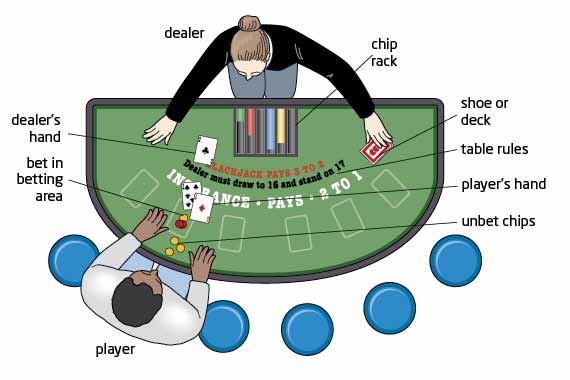

Based on a score of 21, Blackjack provides the player with some of the best odds in the house. This article will explain how to play blackjack for the beginner and include some useful tips. The objective of Blackjack is for a Player to have a higher total than the Dealer without busting (going over 21). Prior to receiving any cards, the Player must place a bet. The cards are dealt in rotation from the Dealer, left-to-right. The Dealer’s hand has one card face down and one card face up. If the Player’s card total is closer to 21 than the Dealer’s, the Player wins. The Player wins if the Dealer’s card total is higher than 21. The Player also wins with Blackjack when the Dealer’s score is 21 made up of three or more cards. If the Player’s total is over 21, the Player loses. Players have the option to play one or two hands against the Dealer. You have Blackjack when the first two cards equal 21.
In blackjack, the cards are valued as follows:
- An Ace counts as either 1 or 11, you decide.
- The cards from 2 through 10 all are their face value.
- The royal face cards Jack, Queen, and King all have a value of 10.
Blackjack Strategy Part 1: The Basics
When we’re talking Blackjack strategy, we’re talking about six basic components of the game. This section, Part 1, deals with the first three: Hitting and Standing, Doubling Down and Splitting.
Hitting and Standing
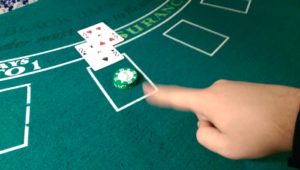
The most basic place to start is hitting and standing. The most fundamental thing to remember is, because the Dealer always has to take a hit on any hand 16 or lower, you won’t win as much money when you’re holding less than 17, unless the Dealer busts. So, how should that statement affect your play? Here’s a quick rundown.
If your hand is below 17 and the Dealer is showing an Ace, King, Queen, Jack, 10, 9 or 8, you need to take a hit. Why? Simple. Whenever the Dealer holds one of these cards, his chances of busting are very slim, so unless you clear 16, your chances of winning are also slim. There are a few different ways to go when we’re talking “soft hands,” but we’ll delve into those in our Tips and Tricks section.
So you may be asking, when should I stand? If your hand is above 12 and the Dealer shows a 4, 5 or 6, your best play is to stand. When the Dealer is showing any of these three cards, his chances of busting are highest. In fact, it’s more than 40 percent of the time. Think of how silly you’d feel if you took a hit with 15, caught a 10 and busted, only to see that the Dealer had 14 and would have been forced to take a hit and draw the 10 instead of you. Every time you bust yourself instead of busting the Dealer, you’re not winning as much money as you could be winning.
Doubling Down
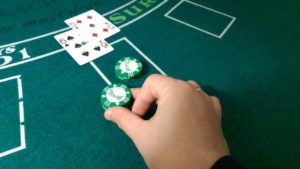
Speaking of money, the best and fastest way to make it when playing Blackjack is by successfully doubling down at every opportunity. Doubling down can make you double your bet or end up costing you double if you do it in a bad spot. The first and most important rule of doubling down: always double down any hand totaling 11. No matter what the Dealer’s showing, if you hit a 10 when you’ve got 11 he won’t beat you.
So when else should you double down? When your hand is 10 and the Dealer is showing a 9 or lower, double it up. When your hand is a 9 or you have a “soft” hand (an ace counted as 11) between 13 and 17 against a Dealer’s 4, 5 or 6, double it up. That’s it though. Those hands give you the best shot at cashing in when you double down. Follow those rules and you’ll end up on the winning end of a double.
Splitting
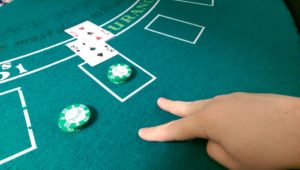
The final strategy point, and what tends to be everyone’s favorite or most hated part of Blackjack, is splitting. Splitting can be highly profitable if you do it with the right cards, or you could end up costing you by splitting a winning hand into a pair of losers.
The first thing to remember when splitting: never split 10’s or 5’s. Tens refers to any card valued 10, whether it be the actual 10 or any face card. Conversely, always split Aces and eights, no matter what the Dealer is showing. The reason behind splitting Aces should be obvious, but you might be perplexed about eights. A pair of eights equals 16, which is really a middle-of-the-road hand in Blackjack. Like we said before, with 16 your only chance of winning is if the Dealer busts. By splitting into a pair of eights, your chances of hitting two hands higher than 16 are actually quite good.
Other than Aces and eights, your best bet when it comes to splitting is to split 2’s and 3’s against the Dealer’s 4, 5 or 6. When it comes to the rest of the cards in the deck (4, 6, 7, 9), the simplest rule is to only split these cards when the Dealer’s hand is showing a card of lesser value. There are variations on this rule however, so you may want to stick with Aces, 8’s, 2’s and 3’s for now.
Blackjack Strategy Part 2: Tips And Tricks
When we’re talking Blackjack strategy, we’re talking about six basic components of the game. This section, Part 2, deals with: Soft Hands, Insurance, and Surrender.
Soft Hands
We initially mentioned soft hands in Part 1, so now let’s delve into the details. Soft hands can be tricky for the Blackjack layman because they have their own special rules when it comes to hitting, standing and doubling down. As a quick reminder, soft hands are any hand with an Ace, where the player can choose between 2 totals, i.e. Ace and 5 could be 6 or 16.
You want to hit a soft 13 through 17 whenever the Dealer is showing 7 or higher. Remember, with any soft hand, no matter what card you receive, you cannot bust. Now here comes the tricky part: doubling soft hands. If you’ve got a soft 13 through 17, only double down when the Dealer shows a 5 or 6. If you’ve got a soft 15 through 17, you can also double up if the Dealer is showing a 4. Most of the time you’ll want to stand on a soft 18, but if the Dealer is sporting a 9, 10 or Ace, you’ll probably be better off taking a hit. With your soft 18, always stand versus a 2, 7 or 8, and double down against a 3, 4, 5 or 6. No matter what the Dealer is showing, always stand on a soft 19 or higher.
Finally on soft hands, if the Dealer holds a 2 and you’ve got a soft hand, do not double down.
Insurance
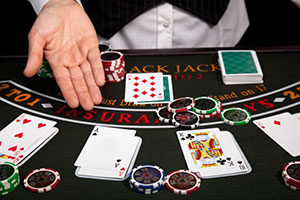
The other mistake players make when a possible Dealer’s Blackjack rears its ugly head is insurance. In the long run, insurance is definitely not worth it, but one of the worst plays you can make is insuring a hand of 20 made of up two 10’s. Think of it this way: you’re insuring yourself against the Dealer having a 10 when you’ve already reduced the odds of him having one by having two yourself. Besides, don’t we already spend enough money on insurance away from the Blackjack table?
Another mistake a lot of Blackjack players can make is choosing the wrong play when the Dealer shows an Ace and could be holding a possible Blackjack. This is one of the worst things that can happen to a player, when they get lucky and catch a Blackjack of their own. If a player has a Blackjack and the Dealer is showing an Ace, the player can still purchase insurance. Many players fear having a push forced on them and end up taking ‘even money’. Taking Insurance on your Blackjack vs. a Dealer’s Ace is called ‘even money’ because regardless of the Dealer’s hand, you will take an ‘even money’ payout of 1-1 on your Blackjack.
By taking even money, you could be giving away potential winnings. You may lose out on a few wins once in awhile, but your Blackjack account will be reduced in the long run by taking even money.
Surrender

One final tip before hitting the tables to make your Blackjack fortune: don’t be afraid to surrender if the option is given to you. If, after the cards are dealt, the Dealer is way ahead and the chances of you pulling out a win are slim, surrender, get 50 percent of your bet back and live to play another hand. If you’re stuck on when to surrender and when to play on, remember this: always surrender with a hard 15 when the Dealer has a 10, and always surrender with a hard 16 when the Dealer has a 9, 10 or ace. Read our in-depth article on The Surrender Move in Blackjack.
Rule Variations
Dealer stands on soft 17
Stands on soft 17 is the classic rule of Blackjack. Under this rule, the dealer will stand as soon as his score reaches 17 or above.
Dealer hits on soft 17 Soft 17 is an optional rule that is not used at every Blackjack table. It is always used in Blackjack Switch. The rule itself is very simple and says that the dealer must always draw another card if his hand is soft 17, that is he has 17 soft points (his hand includes an Ace). The dealer will still stand on hard 17. This rule slightly increases the house advantage.
Doubling
Doubling varies from online casino to casino. It can be prohibited entirely in some casinos, while some online casinos will allow you to double on any two cards and some will only let you double if your cards are of certain value. Please refer to your game manual!
Doubling after split
Doubling after split is a seldom met rule that allows the player to double even after the hands were split. It’s worth remembering during doubling after split that 21 is not considered a natural hand after a split.
Surrender
Surrender is often prohibited altogether, but if it is not it can either be “early” or “late”. The difference is in that the early surrender can be invoked before the dealer checks for Blackjack. It is a small and often over-sought rule that is crucial for proper Online Blackjack strategy.
Hole Cards
Hole cards are the dealer’s cards that are left face down by the dealer. This rule rarely means anything in online casinos but we feel its worth mentioning.
In General
If you’re looking to avoid some other common mistakes, perk up your ears. If you think playing two hands instead of one against the Dealer gives you better odds of winning, you’re mistaken. Playing two hands will give you the same advantage as two different players playing a single hand versus the Dealer using exactly the same strategy. The advantage there is zero.
For more info on the proper use of hand signals, see our article on Hand Signals & Terminology in Blackjack.
Remember, although this article explains how to play the game of blackjack, you’ll need a strategy if you’re going to beat the dealer and leave the casino with a profit. There are many strategies one can employ to try to gain an edge over the house, but most are complicated or impractical use in a real casino setting. We recommend the Easy Money Blackjack System™ for the fastest and easiest way to win at the game of blackjack.
Practice Casino Games FREE, Instantly!
Before you make bets with your hard-earned cash in a casino, why not practice? Playing these games won’t cost you a penny if you lose. When you’re confident in your playing ability you can always switch to real money. BOVADA’S demo games are the best because there’s no waiting for casino software downloads and no dealing with a lengthy registration. You can have fun and play blackjack online instantly without giving them any information. After the redirect to Bovada’s online casino, simply close the registration pup-up and choose a game. Experience what true leisure online gaming is all about. 2 clicks and you’re in action. Choose a game below…
***************************************************
By the way, I've played at many of the TOP RATED online casinos on the net, and I can say that BOVADA'S LIVE BLACKJACK games offer the best surrender games in the industry.
Their payouts are fast and their customer support is top notch. They make make it easy to make Bitcoin and all major credit card deposits.
Sign up for free or take advantage of their amazing welcome bonuses currently over $3K! click the link >> BOVADA BONUSES
Or play one of their 8 FREE blackjack software DEMO GAMES (after the redirect, just close the pop-up sign-up & select a game) link >> DEMO BLACKJACK GAMES
*Disclaimer - I do receive a commission if you decide to deposit and play with real money.




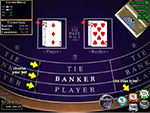
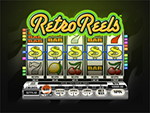
Find casinos that offer the best rules by visiting our Casino Rules & Conditions page. Enjoy.